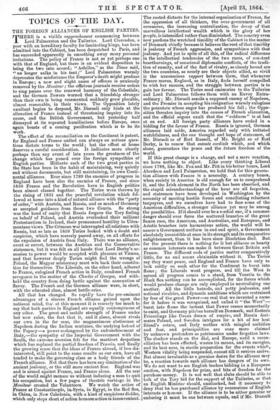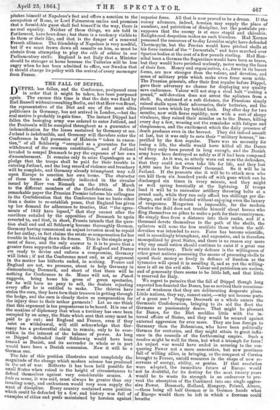TOPICS OF THE DAY.
•
THE FOREIGN ALLIANCES OF ENGLISH PARTIES.
THERE is a visible rapprochement commencine. between Lord Palmerston and the Tuileries. Lord Clarendon, a peer with an hereditary faculty for fascinating kings, has been admitted into the Cabinet, has been despatched to Paris, and has succeeded apparently in smoothing away many personal irritations. The policy of France is not as yet perhaps one with that of England, but there is an evident disposition to bring the two into accord; "Achilles," as the Times said, "no longer sulks in his tent ;" Lord Palmerston warmly deprecates the misfortunes the Emperor's death might produce in Europe ; a new and slight cause of offence is anxiously removed by the Malheur; the officious journals receive orders to sing weans over the renewed harmony of the Celestials; and the German Powers warned that a friendship stronger than their own is being recemented suddenly grow placable, almost reasonable, in their views. The Opposition lately exultant begins to despond, Mr. Disraeli only hints at the alienation of France instead of threatening inquiry into its cause, and the British Government, but yesterday half dismayed at its repeated humiliations before Europe, once again boasts of a coming pacification which is to be its work.
The effect of the reconciliation on the Continent is patent, for England and France united can always on serious ques- tions dictate terms to the world ; but the effect at home deserves a careful consideration. It indicates more clearly perhaps than any event of late years the greatness of the change which has passed over the foreign sympathies of English parties. Hitherto each of the two great parties in the State has been in the habit of maintaining, very quietly and without documents, but still maintaining, its own Conti- nental alliances. Ever since 1789 the enemies of progress in England have been also the enemies of France, and since 1830 France and the Revolution have in English politics been almost classed together. The Tories were thrown by the rising of 1831 and the peaceful revolution which fol- lowed at home into a kind of natural alliance with the "party of order," with Austria, and Russia, and as much of Germany as accepted guidance from those two Courts. So strong was the bond of amity that Russia forgave the Tory feeling on behalf of Poland, and Austria overlooked their militant Protestantism in Ireland, their pronounced hostility to Ultra- montane views. The Crimean war interrupted all relations with Russia, but so late as 1859 Tories looked with a doubt and suspicion, which have scarcely passed away, on all efforts for the expulsion of Austria from Italy. There was no alliance, overt or covert, between the Austrian and the Conservative statesmen, but it was felt on all hands that Lord Derby's ac- cession to power would be accepted with pleasure at Vienna, and that however deeply Tories might feel the wrongs of Poland, the Magyar aristocracy must win back their constitu- tion for themselves. The Liberals, on the other hand, adhered to France, eulogized French action in Italy, condoned French arrogance in the matter of the Charles et Georges, and with- held the country from doing battle against the annexation of Savoy. The French and the German alliance were, in short, with the educated class, almost battle-cries.
All that has changed. So rapidly have the pre-eminent advantages of a sincere French alliance gained upon the national mind, tha', at this moment it is scarcely too much to say that both parties in England are equally contemptuous of any other. The great and mobile strength of France under her new ruler, the fact that it, and it alone, almost rivals our own in the far seas, the magnanimous abstinence of Napoleon during the Indian mutinies, the undying hatred of the Papacy—a power endangered by the enfranchisement of Italy,—the sympathy of the Imperial Government with the South, the extreme aversion felt for the martinet despotism which has replaced the partial freedom of Prussia, and finally the growing sense that the ideas of France abroad, if less dis- interested, still point to the same results as our own, have all tended to make the governing class as a body friends of the French alliance. Not that there has been any diminution of the ancient jealousy, or the still more ancient fear. England was
and is armed against France, and France alone. All the rest of the world might menace us without inducing a man is quit his occupation, but a few pages of theatric verbiage in the Moniteur created the Volunteers. We watch the action of France at Constantinople, in. Syria, in Egypt, in the Red Sea, in China, in New Caledonia, with a kind of suspicious dislike, which only stops short of action because action is inconvenient.
The rooted distaste for the internal organization of France, for the oppression of all thinkers, the over-government of all commerce, the increasing centralization, the decay of that marvellous intellectual wealth which is the glory of her people, is intensified rather than diminished. The coun try even now pardons the wretched timidity of the Cabinet in the matter of Denmark chiefly because it believes the root of that timidity is jealousy of French aggression, and sympathizes with that jealousy. And yet in spite of all this, of the radical difference in the intellectual tendencies of the two races, of constant heartburnings, of occasional diplomatic conflicts, of the tradi- tion of enmity, and of the fact of rivalry, so closely bound are the two countries, so nearly are their objects allied, so vivid
is the unconscious rapport between them, that whenever France moves, England, as in Italy, finds herself compelled to wish her success, and the struggle between parties is to gain her favour. The Tories send emissaries to the Tuileries and Lord Palmerston follows them with an Envoy Extra- ordinary ; Mr. Disraeli assails a supposed enemy of Napoleon, and the Premier in accepting his resignation warmly eulogizes the potentate whose anger has produced his fall ; the Oppo- sition threaten inquiry into the causes of French alienation, and the official organs exult that the " coldness " is at last at an end. All foreign party alliances have ended in a bidding for the favour of France. Russia is ignored, German alliances laid aside, America regarded only with irritated watchfulness, and the one thought and hope of statesmen, of Mr. Disraeli as of Earl Russell, of Mr. Bright as of Earl Derby, is to renew that entente cordiale which, and which alone, guarantees the peace and the future freedom of the world.
If this great change is a change, and not a mere reaction, we have nothing to object. Like every thinking Liberal since 1789, like lir. Fox and Mr. Pitt in his better hours, Lord Aberdeen and Lord Palmerston, we hold that for this genera- tion alliance with France is a necessity. A century hence, when society in America is old enough for us to comprehend it, and the Irish element in the North has been absorbed, and the stupid misunderstandings of the hour are all forgotten, and statesmen have been developed in Washington by the necessity of meeting hostile forces and conciliating reluctant taxpayers, and we ourselves have had to face some of the American difficulties, a stronger alliance yet may be among the possibilities. If it should ever be a cordial one, if a common danger should ever force the scattered branches of the great Saxon race, the American, and Australian, and European, and Asiatic branches into harmonious action, the world will be nearer a Government uniform in end and spirit, a Government absolutely irresistible at once in its strength and its comparative enlightenment, than it has been since Diocletian died. But for the present there is nothing for it but alliance as hearty as common interests can make it between Great Britain and France. The different ends of parties matter comparatively little, for no end seems obtainable without it. The Tories say they want peace, and England and France have only to look coldly on each other for the Continent to burst into flame ; the Liberals want progress, and till the West is agreed all progress comes to a stand, from Venetia to. the Black Sea nothing can be accomplished, for the forces which would produce change are only employed in neutralizing one another. All the little hatreds, and petty jealousies, and national rivalries, and dynastic ambitions which are restrained by fear of the great Power—so real that we invented a name for it before it was recognized, and called it " the West"— burst into flame the instant that Power ceases momentarily to exist, and Germany pitches herself on Denmark, and Eastern Princelings like Couza dream of empire, and Russia deci- mates Poland, and Sweden intrigues for a bit of her best friend's estate, and Italy seethes with mingled ambition and fear, and principalities are once more claimed by unknown pretenders as patrimonies under forgotten laws. The shadow stands on the dial, and Europe, until a recon- ciliation has been effected, wastes its means, and its energies, and its best sons, in sterile preparation for the events which, Western vitality being suspended, cannot till it revives arrive. But almost invaluable as a genuine desire for the alliance may be, a reaction towards such alliance has dangers of its own. We do not want to see English leaders biddine° in a European auction, with Napoleon for prize, and bits of freedom for the purchase-money. It is not well that clubs should be able to talk of the Tory bid for the support of the Tuileries, or that an English Minister should, unattacked, feel it necessary to deny that he has purchased alliance by concessions of English interests or honour. If the alliance is to be either genuine or enduring it must be one between equals, and if Mr. Disraeli pitches himself at Napoleon's feet and offers a sanction to the occupation of Rome, or Lard Palmerston smiles and promises that a formidable guest shall feel himself in the way, there is SD real equality. Neither of these things, we are told in Parliament, have been done ; but there is a tendency visible to do them or their like, and that is the danger of a renewed French alliance. The friendship of Napoleon is very needful, but if we must frown down all assaults on him, so must he .abstain from attempting to play the mile of arbiter in our Parliamentary strife. England is not Italy that a Minister should be stronger at home because the Tuileries will be less angry when he has been admitted to office, nor Sweden that it should change its policy with the arrival of every messenger from France.































 Previous page
Previous page